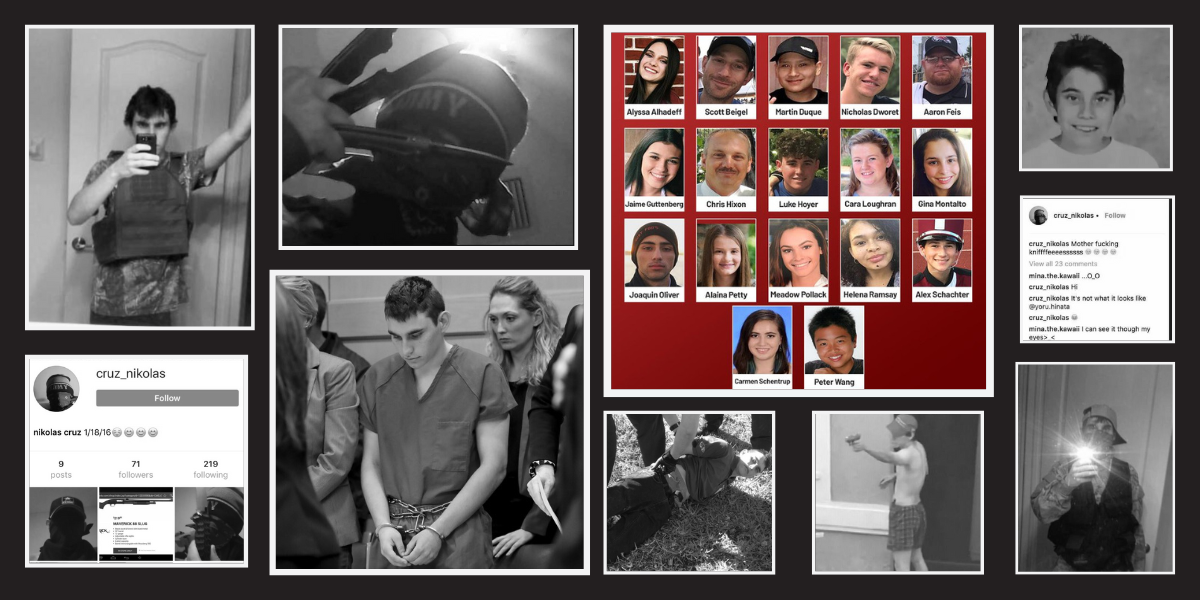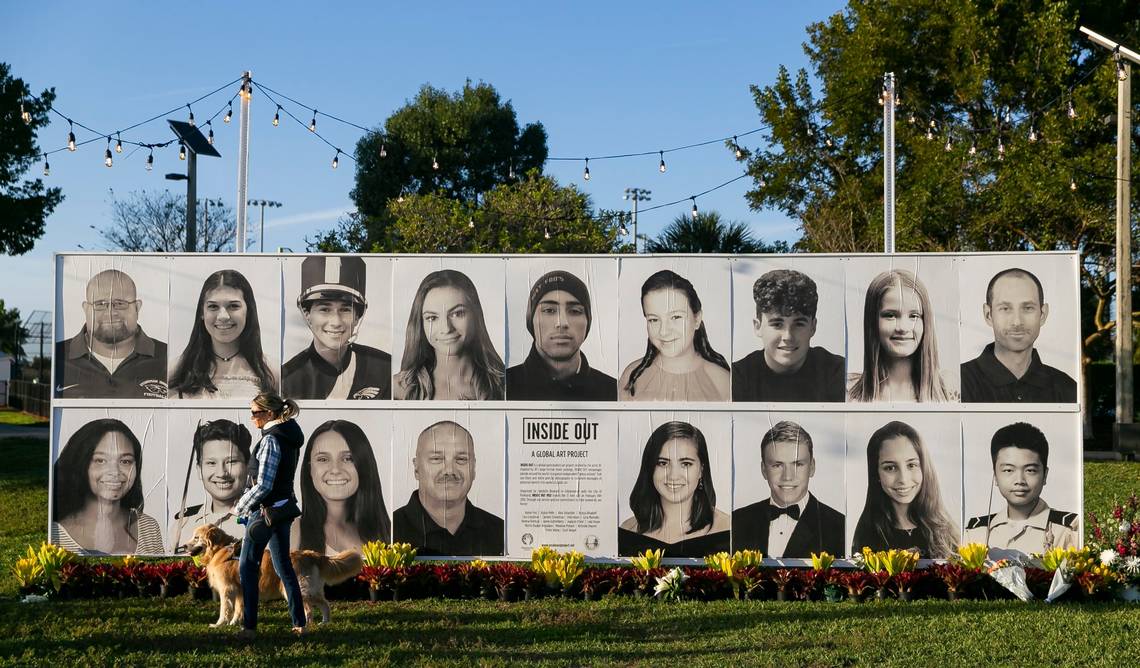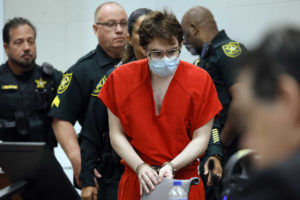By: Katherine Trykowski
Why were tips about Nikolas Cruz’s behavior seemingly ignored? Could our government learn from the Marjory Stoneman Douglas shooting to prevent more?

When Nikolas Cruz senselessly murdered 17 people at Stoneman Douglas High School in Parkland, Florida on Valentine’s Day 2018, there were quite a few people that were not surprised.
Declassified reports from the FBI detailing mishaps in their anonymous tip call centers reveal that people had been trying to flag Cruz since 2017. However, due to a myriad of issues beyond understaffing, exhaustion from working late shifts, and frustration over prank calls, tipsters’ warnings might have been prematurely pushed to the side.
Five years after the Parkland massacre, it feels like not much has changed in regards to school shootings.
The latest data details that 338,000 children are exposed to gun violence at school each year, and this number has only grown. This year alone, the US has suffered at least 67 mass shootings — attacks in which four or more people are shot, not including the assailiant — according to the Gun Violence Archive.
Just earlier this week, breaking news alerts flooded phones with the headline: “Michigan State University shooting live updates!” By the end of the carnage, three students were killed and five more were wounded. More information is still coming to light about the 43-year-old gunman who turned the firearm onto himself at the end of the attack.
Like previous offenders, officials are noting that Anthony McRae displayed warning signs, namely a history of mental health issues and a rap sheet with multiple gun-related crimes.
Neighbors say McRae was a “hell-raiser” and would practice target shooting out of his back door.
These red flags for the latest American tragedy eerily mirror the red flags Nikolas Cruz presented — but in Cruz’s case, credible tips were ignored.
A full investigation into those who staffed tip hotline centers revealed that they had been poorly trained and were not confident in their ability to successfully follow through on tip documentation. The official inquiry, which was released on February 18, 2018, also shockingly reported that the center documented less than 1% of calls, as the majority of calls received (especially during the evening), were nuisance calls.
Call technicians skipped meals and breaks to attend to the high volume of calls, which added to frustration, led to making mistakes, and a lack of attention to detail.
Unfortunately, these conditions led to a perfect storm that allowed for a break in the chain of command. About a month before the shooting, a person close to Cruz called the tip line to report Cruz’s expressed desire to hurt people, that he had purchased weapons, his concerning behavior, and social media posts indicating his desire to kill other students.
The tip was recorded, but the information was not forwarded to the field office in Miami, where officers would then have gone to Cruz’s home, and then potentially prevented a mass shooting.
Hindsight is 20/20
An investigation into Cruz’s school and home life uncovered a shocking pattern of troubling behavior that reached back over a decade before the shooting — but whether Cruz was a product of his own troubled past, failed by the school system, or simply deviant is up for debate.

Information dating back as early as 2008 points to massive social and familial dysfunction that ensured Cruz proper help and care out of his reach was out of reach. Sheriff’s logs detailing incidents from 2008-2017 recorded a minimum of 47 calls made on or about Cruz’s residence.
Any teenager growing up in a household where police officers come over more often than distant relatives is a deteriorating household.
Cruz was known to have public suicidal ideation. He would post on Snapchat that he wished to purchase weapons, kill people, and commit suicide. He also recorded and posted videos of himself self-harming. Both 2016 and 2017 specifically were active years for tips and inquiries into Cruz’s care.
Somehow, Cruz still slipped through the cracks.
In September of 2016, resource officers and guidance counselors were pushing for Cruz to be placed in a psychiatric facility due to growing concerns over his intent to harm himself or others.
Months prior to the fateful day in February 2018, an anonymous tip was made to the same FBI tip line that fumbled information before the shooting, indicating that Cruz was calling himself a school shooter under YouTube videos. During this timeframe, Cruz was actively posting slurs and hate speech on the internet, and using his father’s wrongful death compensation money to purchase guns and ammunition.
After the Valentine’s Day tragedy, the Marjory Stoneman Douglas High School Public Safety Commission released documentation of unreported information showing Nikolas Cruz’s troubling behavior. The evidence and interviews showed that at least 30 people had knowledge about Cruz’s troubled state of mind.
Unfortunately, these witnesses raised red flags when it was already too late.
Cruz himself also recognized that he was in dire need of help.
When he shared with school officials his specific concern about his declining grades and ability to graduate with the rest of his class, the school’s academic support team recommended that he transfer to another school where he had previously been successful. However, as Cruz was now a legal adult, he decided to drop out of school, complete his GED program, and then find work.
In another surprising blunder, Cruz was given erroneous information that he would not be able to access his special education resources if he stayed enrolled as a student.
Some experts suggest if he was not given this incorrect information, Cruz might have stayed in the program, potentially avoiding the stressors that led to the shooting.
Hindsight is 20/20. And in hindsight, there were many possible avenues and opportunities to prevent Cruz from purchasing weapons, ammunition, and having his access to social media platforms revoked so he couldn’t speak on his desire to harm himself and others.
Life in Prison Without Parole

Cruz as he entered the courtroom for his sentencing hearing at the Broward County Courthouse. (Amy Beth Bennett/South Florida Sun Sentinel via AP, Pool)
In court, Cruz was found competent to stand trial, and was convicted to 36 consecutive life sentences without the possibility of parole in November of last year. In prison, Cruz obtained another charge for assaulting a corrections officer in November 2018, when he punched an officer and grabbed his taser during the altercation.
This assault added another 26 years to his lengthy sentence and proved to the court that he still displayed egregious behavioral issues even while incarcerated.
Following the 2018 sentencing, then-Florida governor Rick Scott signed legislation that raised the age to buy firearms in Florida; effectively took guns away from thousands of people deemed to be a threat; and increased mental health resources for students.
Families Cope Through ‘Doing Good’
The victim’s families have had their lives forever altered. Many are honoring their loved one’s memory by starting foundations or performing other charitable work dedicated to a variety of causes.
Most of the families also belong to their group, Stand With Parkland.
Putting aside political differences, those families work with lawmakers nationally to see tougher school safety regulations enacted, gun safety, and advocate to train administrators to conduct more thorough threat assessments and ensure threats reported to the FBI are passed to local law enforcement, according to NBC Miami.
“It is really important to remember that no matter how many ‘good things’ have come out of the aftermath, no one is ever the same again,” Florida state Rep. Christine Hunschofsky said. “No one loses that pain.”
Love this post? Meet the Author.
Uncovered is building a community around collective impact for cold cases and supporting further education to develop citizen detective skills. Interested in contributing? Join our community, or reach out with a topic you’d like to share with our readers.
